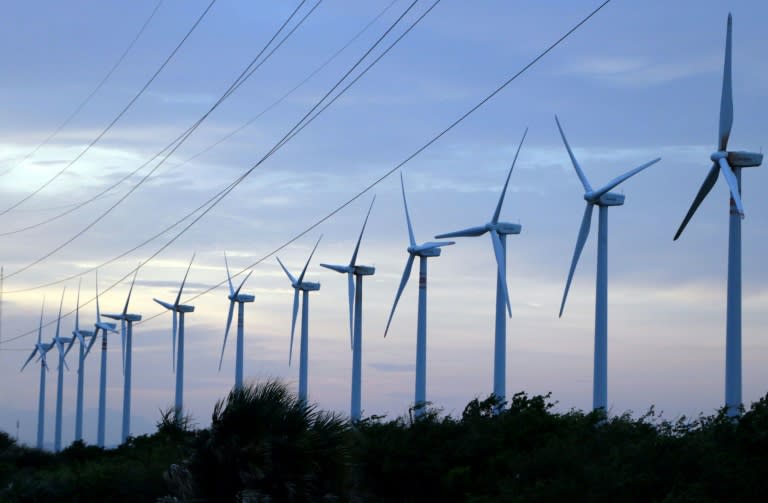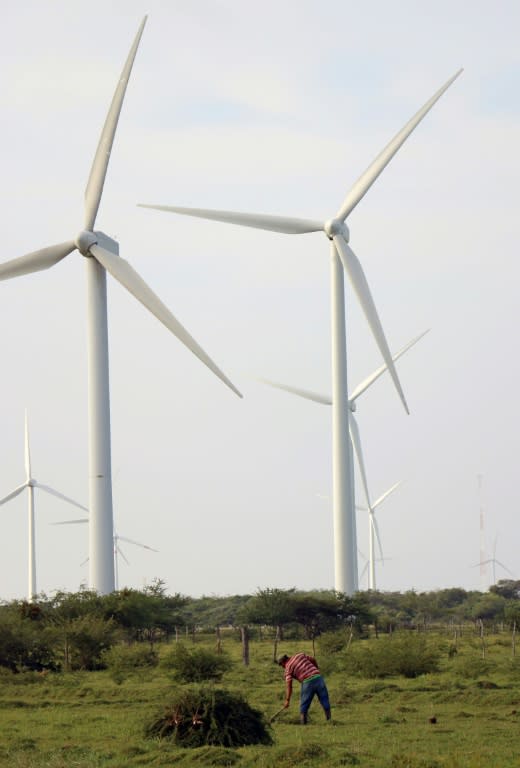Wind energy blows up storm of controversy in Mexico
Cain Lopez looks tiny standing near the seven enormous wind turbines that tower over his farm in the Mexican village of La Ventosa. In this gusty rural region near the Pacific coast, the wind is so strong it sometimes flips over cars and even trailer trucks. Lopez always considered it a curse, until an international energy company came along and said it wanted to build these 40-meter (130-foot) wind turbines on his land, offering him a small fortune by local standards. Now he considers the wind a blessing, he says. But not everyone sees it that way. Some villagers in the southern state of Oaxaca accuse the multi-national energy firms that operate here of breaking promises, tricking them into unfair contracts and failing to consult them sufficiently. Angry protesters wielding sticks and stones have blocked access to wind turbines on several occasions. Last month, 15 people were arrested when the authorities broke up a protest in the town of Juchitan by residents demanding more money for their land. And this month, residents of Union Hidalgo filed a court case seeking to rescind French energy company EDF's permit to build nearly 100 new wind turbines there, saying it failed to properly consult the Zapotec indigenous community. Now, some locals are threatening to shut the wind projects down completely. "If we work together, we can close every single wind farm," says Porfirio Montero, president of a local landowners' association. - Landscape transformed - The landscape of this windswept isthmus has been transformed by the wind turbines, which look like gleaming white forests of stylized trees. Some 2,000 turbines have been built in Oaxaca since 1994, generating 2,347 megawatts -- enough to power half of Mexico City, the sprawling capital located some 700 kilometers (more than 400 miles) away. They are the drivers of a budding green revolution in Mexico, a country that has emerged as a leader on renewable energy. Mexico won praise in 2015 when it became the first emerging country to announce its emissions reduction targets for the United Nations climate accord, ambitiously vowing to halve them by 2050. To get there, it is seeking to generate half its energy from renewable sources. Last year, green energy made up 28 percent of its energy mix, according to the government. Mexico is now the world's 18th largest producer of wind energy, with 3,709 megawatts, and second only to Brazil in Latin America, according to the World Wind Energy Association. The arrival of wind power has been transformational for some. Cain Lopez bought 52 hectares (130 acres) of land 25 years ago in the village of La Ventosa, whose name means "windy" in Spanish. The area lived up to its name: the wind was so strong it could bend trees down to the ground. Lopez couldn't get anything to grow on his land. He ended up using it as pasture for his cattle. "Nobody ever imagined this opportunity would come along to profit from the wind," he told AFP. "It's a blessing." He now earns rent of $2,800 a month -- money he has used to send his kids to college and renovate his ranch house. - Same wind, different prices - But Porfirio Montero, head of the landowners' association, says the energy companies have worsened inequality in the region, one of Mexico's poorest. "Some people earn just $1,700 a month for the same wind turbines" that Lopez has, he said. "There are differences of 25 to 30 percent." And yet, he added, "The air is the air. There's only one." According to Montero, one wind turbine generates electricity worth about $112,000 a day. Non-landholders often get nothing at all. Some companies are accused of breaking promises to fund infrastructure projects to benefit the community. The wind farms create jobs when they are built, but they disappear just as quickly when the projects are done. EDF did not respond to AFP's requests for comment. Another major company that has faced resistance, Spain's Iberdrola, said it has not received any complaints from landowners it rents from. Opponents say they have been excluded from planning this wind energy boom. "Nobody ever told us what was coming," said Union Hidalgo resident Guadalupe Ramirez, 66. "Not the government, and much less the company."



